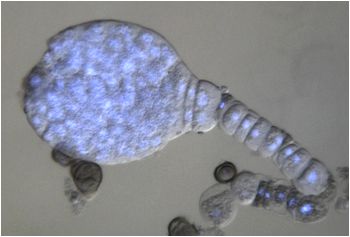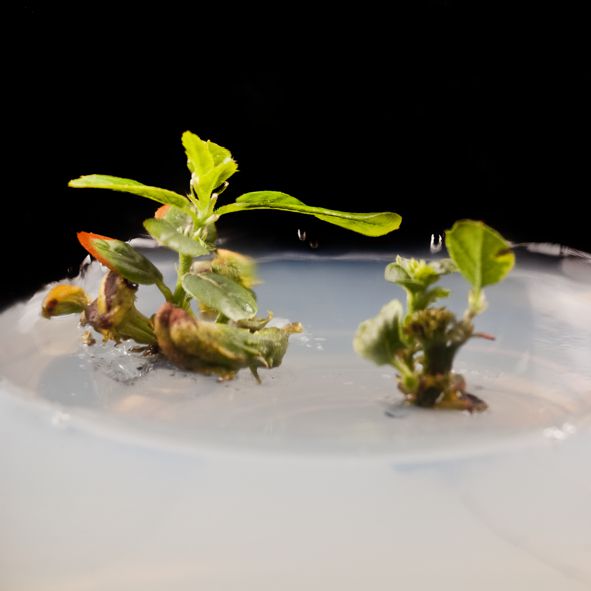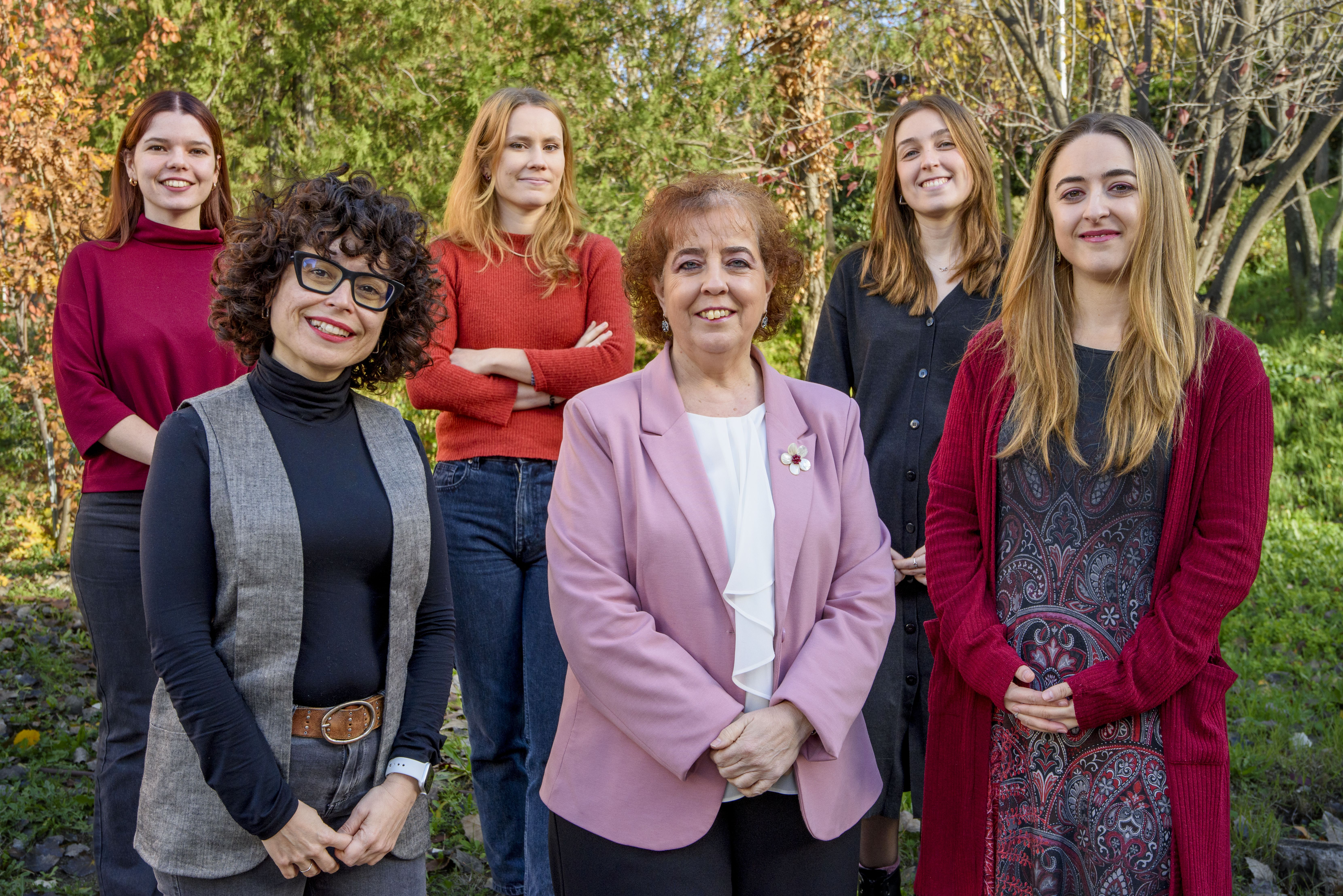Group Leader/s
intro
The increasing social demand for global food security in the face of a changing climate, decreasing natural resources and increasing world population, is pushing the search for new crop varieties, with increasing yield and better adapted to new environmental conditions. Present agriculture faces significant economic pressure worldwide for more efficient and accelerated breeding of crops. In this context, breaking knowledge and efficient technologies to exploit plant cell in vitro reprogramming potential for selected plant regeneration and propagation are highly valuable and needed in plant breeding and biotechnology, as well as in applied and basic plant research.
We investigate the regulatory mechanisms of stress-induced plant cell reprogramming to embryogenesis, key biotechnological process for improvement, regeneration and selection of high quality/adapted plants for agroforestry and industrial sectors. We also analyzed plant cell responses to stress conditions. Our aim is to identify new pathways and molecular targets for chemical intervention by small bioactive compounds to improve in vitro cell response to stress, embryogenesis and plant regeneration yield for crop/forestry breeding.
When reprogramming is induced in the haploid microspore (immature pollen), the process is named stress-induced microspore embryogenesis and constitutes the fastest way to produce haploid and doubled-haploid (DHs) plants. DHs are widely used by seed and horticulture companies as a source of new genetic variability fixed in homozygous plants in only one generation, therefore saving time and costs of breeding programs. When in vitro embryogenesis is induced in other somatic cells, somatic embryogenesis is very useful for large-scale clonal propagation and cryopreservation of elite genotypes in species with long reproductive cycles or low seed set, as many forest species.


We perform our investigation in the model crop species rapeseed and barley, and analyse the transfer of results to other species of agronomic or forestry interest, like cork oak. We use a multidisciplinary and integrated approach with techniques of plant physiology, molecular and cell biology.
MAIN RESEARCH LINES
Stress-induced cell death: We investigate the role of autophagy and cell-death proteases as crucial players in the balance between death and life in the plant cell response to stress conditions required to induce reprogramming towards embryogenesis. The aim is to modulate this response to increase cell viability and embryogenesis yield.
Hormonal regulation of stress-induced cell reprogramming and embryogenesis: Our studies aim to characterize the involvement of phytohormones, mainly auxins and cytokinins, in regulation of cell reprogramming, totipotency acquisition and embryogenesis initiation and progression. Their biosynthesis, intercelular transport, signalling and appropriate auxin/cytokinin balance are required for correct embryogenesis induction and progression.
Epigenetic control of cell reprogramming to embryogenesis: We analyze the role of epigenetic marks, particularly DNA methylation, histone H3-H4 acetylation and H3K9 methylation, among other modfications, in the regulation of the swicht of cell fate. We have identified genome-wide changes of these chromatin modifications that accompany cell reprogramming, and found that define epigenetic modulators can induce such changes and enhance reprogramming.
Cell wall remodelling: Our studies have revealed that remodelling of cell wall, operated by pectin methylesterases and arabinogalactan proteins (AGPs), is induced and neccessary for cell reprogramming and embryo formation.
Small molecules to improve reprogramming of cell fate for new biotech strategies: Recent advances in chemically-controlled reprogramming of specialized cells the great potential of application of small chemical molecules to regulate cellular reprogramming. We investigate the effects of small compounds, by screening of chemical libraires and with modulators of autophagy, proteases, epigenetic marks, and other enzymes, to reduce cell death and improve embryogenesis yield. These small molecules are opening up the development of new biotechnological approaches for improving in vitro embryo production in breeding programs.
Members
| Pilar Sánchez Testillano |
| Elena Carneros García |
| Yolanda Perez Perez |
| Ivett Barany |
| Cristina Rueda Varela |
| Natalia Elena Exposito de la Paz |
| Iñaki Linazasoro Romo |

Selected Publications
Pérez-Pérez Y, Berenguer E, Carneros E, Testillano PS [2024]. Increase of histone acetylation by suberoylanilide hydroxamic acid enhances microspore reprogramming and expression of somatic embryogenesis transcription factors in Brassica napus. Plant Science 351, 112318. DOI: 10.1016/j.plantsci.2024.112318
Carneros E, Berenguer E, Pérez-Perez Y, Pandey S, Welsch R, Palme K, Gil C, Martínez A, Testillano PS [2024]. Small molecule inhibitors of human LRRK2 enhance in vitro embryogenesis and microcallus formation for plant regeneration of crop and model species. J Plant Physiol 303, 154334. DOI:10.1016/j.jplph.2024.154334
Carneros E, Díaz-Luzza EM, Pérez-Pérez Y, Solís MT, Testillano PS [2024]. DNA demethylation by transitory 5-azacytidine treatment improves somatic embryogenesis yield for regeneration and breeding of cork oak. Physiologia Plantarum, 176(1), e14143. doi: 10.1111/ppl.14143
Agius DR, Kapazoglou A, Avramidou EV, Baranek M, Carneros E, Caro E, Castiglione S, CICATELLI EA, Radanovic A, Ebejer JP, Gackowski D, Guarino F, Gulyás A, Hidvégi NT, Hoenicka H, Inácio V, Johannes F, KAralija E, Lieberman-Lazarovich M, Martinelli F, Maury S, Mladenov V, Morais-Cecilio L, Pecinka A, Tani E, Testillano PS, Todorov D, Valledor L, Vassileva V. [2023]. Exploring the crop epigenome: a comparison of DNA methylation profiling techniques. Frontiers in Plant Sciences, 14:1181039. DOI: 10.3389/fpls.2023.1181039.
Carneros E, Sánchez-Muñoz J, Pérez-Pérez Y, Pintos B, Gómez-Garay A, Testillano PS [2023]. Dynamics of Endogenous Auxin and Its Role in Somatic Embryogenesis Induction and Progression in Cork Oak. Plants 12, 1542. Doi: 10.3390/plants12071542.
Brunel-Muguet S, Vetukuri R, Testillano PS [2022]. Epigenetics For Crop Adaptation To Climate Change. Physiologia Plantarum, 174: e13835. DOI: 10.1002/PPL.13835.
Gómez-Mena C, Honys D, Datla R, Testillano PS [2022]. Advances in Pollen Research: Biology, Biotechnology and Plant Breeding Applications. Frontiers in Plant Science 13:876502. doi: 10.3389/fpls.2022.876502
Silva AC, Ruiz-Ferrer V, Pellegrin C, Müller SY, Martínez-Gómez A, Gómez A, Abril P, Berenguer E, Testillano PS, Andrés MF, Fenoll C, Eves-Van Den Akker S, Escobar C [2022]. DNA-methylation landscape of the root-knot nematode-induced pseudo-organ, the gall, in Arabidopsis, is dynamic, contrasting over time, and critically important for successful parasitism. New Phytologist, DOI: 10.1111/nph.183
Berenguer E, Carneros E, Pérez-Pérez Y, Gil C, Martínez A, Testillano PS. [2021]. Small molecule inhibitors of mammalian GSK-3β promote in vitro plant cell reprogramming and somatic embryogenesis in crop and forest species. J. Exp. Bot., 72, 7808-7825. DOI: 10.1093/jxb/erab365.
Kakoulidou I, Avramidou EV , Baránek M , Brunel-Muguet S, Farrona S,Johannes F, Kaiserli E , Lieberman-Lazarovich M, Martinelli F ,Mladenov V , Testillano PS , Vassileva V, Maury S [2021]. Epigenetics for Crop Improvement in Times of Global Change. Biology 10, 766.
Mladenov V, Fotopoulos V, Kaiserli E, Karalija E, Maury S, Miroslav B, Segal N, Testillano PS, Vassileva V, Pinto G, et al. [2021]. Deciphering the Epigenetic Alphabet Involved in Transgenerational Stress Memory in Crops. Int. J. Mol. Sci. 2021, 22, 7118. doi: 10.3390/ijms22137118
Pérez-Pastrana J, Testillano PS, Barany I, Canto-Flick A, Álvarez-López D, Pijeira-Fernández G, Avilés-Viñas SA, Peña-Yam L, Muñoz-Ramírez L, Nahuat-Dzib S, Islas-Flores I, Santana-Buzzy N [2020]. Endogenous auxin accumulation/localization during zygotic and somatic embryogenesis of Capsicum chinense Jacq. J. Plant Physiology, Published on line 15-Dec-2020. DOI: 10.1016/j.jplph.2020.153333.
Berenguer E, Minina EA, Carneros E, Bárány I, Bozhkov PV, Testillano PS [2020]. Suppression of metacaspase and autophagy-dependent cell death improves stress-induced microspore embryogenesis in Brassica napus. Plant and Cell Physiology, DOI: 10.1093/pcp/pcaa128.
Ibáñez S, Carneros E, Testillano PS, Pérez-Pérez JM [2020]. Advances in Plant Regeneration: Shake, Rattle & Roll. Plants, 9, 897.
Pérez-Pérez Y, El-Tantawy AA, Solís MT, Risueño MC, Testillano PS [2019]. Stress-induced microspore embryogenesis requires endogenous auxin synthesis and polar transport in barley. Frontiers in Plant Science 10:1200. DOI: 10.3389/fpls.2019.01200.
Funding
Projects currently in progress
AEI, PID2023-146824OB-I00: In vitro plant regeneration for crop improvement and reforestation: new molecular effectors and chemical strategies with small molecules (01/09/2024-31/08/2027) PI: Pilar s. Testillano
AEI, PID2020-113018RB-I00: New molecular determinants and small molecules to improve plant cell reprogramming and regeneration for breeding of crop and forest species (01/09/2021-31/03/2025) PI: PS Testillano
AEI, TED2021-129633B-I00: In vitro regeneration of resilient trees to recover agroforestry ecosystems threatened by the climate change: new strategies with small molecules (01/12/2022-30/09/2025) PIs: PS Testillano (CIB) and E Corredoira (MBG-CSIC)
AEI,CPP2021-008750: Innovative small molecules for in vitro propagation of recalcitrant crop plants (ISMoPP), Oct. 2022-Sept. 2025, PI: PS Testillano, Company: Seeds for Innovation SL.
AEI CPP2022-09890:Nuevos ingredientes funcionales derivados del fruto de Argania spinosa y su potencial uso en la industria biotecnológica y biomédica, Oct. 2023-Sept. 2026, PIs: PS Testillano, A. Martínez (CIB-CSIC), Company: Cellbitec SL.
COST Action CA19125 (EPI-CATCH: EPIgenetic mechanisms of Crop AdapTation to Climate cHange) EU (2020- 2024). Chair: F. Martinelli (Univ. Florence, Italy), Managing Committee member, Core group member and WG3 co-leader: PS Testillano
COST Action CA21157 (COPYTREE) European Network for Innovative Woody Plant Cloning. (2022-2026) Chair: Stefaan Werbrouck (Univ. Ghent, Belgium), Core group member and WG4 co-leader: PS Testillano.
Past projects (last years)
NATIONAL PROJECTS
AEI/FEDER, AGL2017-82447-R (2018-2021), PI: PS Testillano
Contract CSIC-Alcaliber I+D+i N.20171981 (2017-2021) PI: PS Testillano
MINECO, AGL2014-52028-R (2015-2018), PI: PS Testillano
MINECO, BFU2015-71869-REDT, Network of Excellence in Autophagy Research, NEAR (2015-2017), PI: P. Boya.
MICINN, BFU2011-23752 (2012-2015), PI: PS Testillano
MICINN, BFU2008-00203 (2009-2011), PI: PS Testillano
MICINN, Network of In vitro Culture and Genetic Transformation of Fruit Species, BIO2007-30945-E (2008-2011)
MICINN, Network of Genomics and Genetic Diversity in Forestry, GEN2FOR (2007-2011)
MEC, Network of Plant Development (2002-2011)
INTERNATIONAL PROJECTS:
COST Action CA15138 (TRANSAUTOPHAGY) EU (2015-2020) Chair: C. Vindis
H2020 MC-ITN 675132 (MASSTRPLAN), EU (2015-2019) CSIC Chair: D. Pérez-Sala.
COST ACTION FA0903 (HAPRECI), EU (2011-2014). Chair: E. Albertini.
MINECO/BioFIG-Univ. Lisboa (Portugal), PRI-AIBPT-2011-0763. (2012-2015). PIs: PS Testillano/S Coimbra.
Univ. Palermo (Italy) CORI 66444 (2012-2014). PIs: PS Testillano/MA Germana.
CSIC/CNR/Univ. Palermo (Italy) 2008IT0046. (2012-2014) PIs: PS Testillano/L Baldoni.
CSIC/UNAM (Méjico) Programa Ignacio Bolívar (2010-1011) PIs: PS Testillano/J Cortés.
More info
TECHNOLOGY TRANSFER
Patents
EP19383042-PCT/EP2020/083316,US20230025843 . Mammal kinase inhibitors to promote in vitro embryogenesis induction of plants. Priority: Europe, Date: 27-Nov-2019. INVENTORS: TESTILLANO PS, MARTÍNEZ A, GIL C, BERENGUER E, CARNEROS E, PÉREZ-PÉREZ Y. Licensed by Hudson River Biotechnology (The Netherlands). Jul. 2022 and Seeds for Innovation (Spain), July 2023.Aprouved: June 2024 (Europe).
EP21383157-PCT/EP2022/085208, US1641.1672 . Phosphodiesterases inhibitors to promote in vitro plant cell reprogramming towards plant embryogenesis or microcallus formation. (Europe, priority date: 17-12-2021) INVENTORS: PS. Testillano, A. Martínez, C. Gil, E. Carneros, Y. Pérez, S. Pandey, R. Welsch, K. Palme.
Contracts with Companies
Contract CSIC-Alcaliber I+D+i (N.20171981): Analyses of key factors in the in vitro culture of anthers and embryogenesis induction for doubled-haploid production in Papaver somniferum. (2017-2021) PI: PS Testillano

